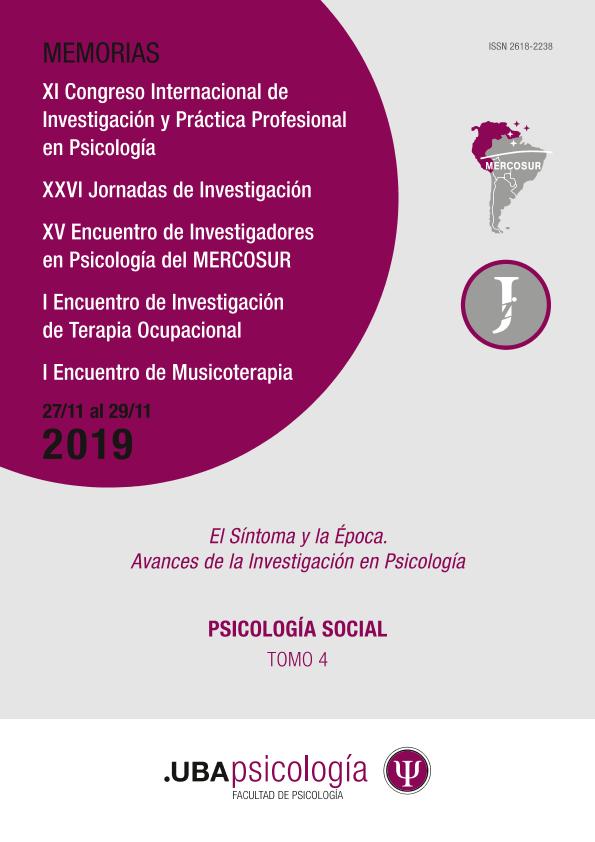Mostrar el registro sencillo del ítem
dc.contributor.author
Pesce, Agustina

dc.contributor.author
Bria, María Paula

dc.contributor.author
Gomez Yepes, Talia

dc.contributor.author
Etchezahar, Edgardo Daniel

dc.date.available
2022-08-12T10:35:19Z
dc.date.issued
2019
dc.identifier.citation
Actitudes hacia el lenguaje Inclusivo según los niveles de sexismo y autoritarismo; XI Congreso Internacional de Investigación y Práctica Profesional en Psicología; XXVI Jornadas de Investigación; XV Encuentro de Investigadores en Psicología del MERCOSUR; I Encuentro de Investigación de Terapia Ocupacional y I Encuentro de Musicoterapia; Ciudad Autónoma de Buenos Aires; Argentina; 2019; 111-112
dc.identifier.issn
2618-2238
dc.identifier.uri
http://hdl.handle.net/11336/165316
dc.description.abstract
El lenguaje inclusivo hace referencia al uso del lenguaje que no reconoce al género masculino como genérico de la humanidad, representando un intento por reducir la comunicación de estereotipos de género a través del lenguaje. En el marco de la psicología, el autoritarismo del ala de derechas, entendido como la covariación de los conglomerados actitudinales convencionalismo, sumisión autoritaria y agresión autoritaria, ha resultado útil para predecir el rechazo de reclamos por una mayor igualdad de género como es el uso del lenguaje inclusivo. Además, el sexismo ambivalente entendido como las manifestaciones de prejuicio hacia las mujeres tanto en sus formas hostiles como benevolentes, también se ha relacionado con el rechazo al uso de lenguaje inclusivo. El objetivo del presente estudio fue analizar la relación que guarda el uso del lenguaje inclusivo con el autoritarismo del ala de derechas y el sexismo ambivalente. Se trabajó con una muestra compuesta por 834 adultos de Buenos Aires. Los resultados obtenidos indicaron que el sexismo ambivalente y el autoritarismo del ala de derechas se relacionaron de manera negativa con el uso de lenguaje inclusivo. Finalmente se analizan las implicancias de los resultados obtenidos y se plantean futuras líneas de trabajo en la temática.
dc.description.abstract
Inclusive language refers to the use of language that does not recognize the masculine gender as generic to humanity, representing an attempt to reduce the communication of gender stereotypes through language. Within the framework of psychology, the authoritarianism of the wing of the right, understood as the covariation of attitudinal conglomerates conventionalism, authoritarian submission and authoritarian aggression, has been useful in predicting the rejection of claims by a greater majority of gender as the correct use inclusive language. In addition, ambivalent sexism as manifestations of prejudice towards women in both hostile and benevolent forms, has also been related to the rejection of the use of inclusive language. The objective of the present study was the relation that keeps the use of inclusive language with the authoritarianism of the wing of the rights and the ambivalent sexism. We work with a sample composed of 834 adults from Buenos Aires. The results indicated that the ambivalent sexism and the authoritarianism of the wing of the right are negatively related to the use of inclusive language. Finally, the implications of the results are analyzed and future lines of work on the subject are proposed.
dc.format
application/pdf
dc.language.iso
spa
dc.publisher
Universidad de Buenos Aires. Facultad de Psicología
dc.rights
info:eu-repo/semantics/openAccess
dc.rights.uri
https://creativecommons.org/licenses/by-nc-sa/2.5/ar/
dc.subject
Lenguaje inclusivo
dc.subject
Género
dc.subject
Sexismo
dc.subject
Autoritarismo
dc.subject.classification
Otras Psicología

dc.subject.classification
Psicología

dc.subject.classification
CIENCIAS SOCIALES

dc.title
Actitudes hacia el lenguaje Inclusivo según los niveles de sexismo y autoritarismo
dc.title
Attitudes towards inclusive language according to levels of sexism and authoritarianism
dc.type
info:eu-repo/semantics/publishedVersion
dc.type
info:eu-repo/semantics/conferenceObject
dc.type
info:ar-repo/semantics/documento de conferencia
dc.date.updated
2022-07-07T13:37:00Z
dc.journal.pagination
111-112
dc.journal.pais
Argentina

dc.journal.ciudad
Ciudad Autónoma de Buenos Aires
dc.description.fil
Fil: Pesce, Agustina. Universidad de Buenos Aires. Facultad de Psicología; Argentina. Consejo Nacional de Investigaciones Científicas y Técnicas. Oficina de Coordinación Administrativa Saavedra 15. Centro Interdisciplinario de Investigaciones en Psicología Matemática y Experimental Dr. Horacio J. A. Rimoldi; Argentina
dc.description.fil
Fil: Bria, María Paula. Universidad de Buenos Aires. Facultad de Psicología; Argentina
dc.description.fil
Fil: Gomez Yepes, Talia. Universidad Nacional de Lomas de Zamora. Facultad de Ciencias Sociales; Argentina
dc.description.fil
Fil: Etchezahar, Edgardo Daniel. Consejo Nacional de Investigaciones Científicas y Técnicas. Oficina de Coordinación Administrativa Saavedra 15. Centro Interdisciplinario de Investigaciones en Psicología Matemática y Experimental Dr. Horacio J. A. Rimoldi; Argentina
dc.relation.alternativeid
info:eu-repo/semantics/altIdentifier/url/http://jimemorias.psi.uba.ar/index.aspx?anio=2019
dc.conicet.rol
Autor

dc.conicet.rol
Autor

dc.conicet.rol
Autor

dc.conicet.rol
Autor

dc.coverage
Internacional
dc.type.subtype
Congreso
dc.description.nombreEvento
XI Congreso Internacional de Investigación y Práctica Profesional en Psicología; XXVI Jornadas de Investigación; XV Encuentro de Investigadores en Psicología del MERCOSUR; I Encuentro de Investigación de Terapia Ocupacional y I Encuentro de Musicoterapia
dc.date.evento
2019-11-27
dc.description.ciudadEvento
Ciudad Autónoma de Buenos Aires
dc.description.paisEvento
Argentina

dc.type.publicacion
Journal
dc.description.institucionOrganizadora
Universidad de Buenos Aires. Facultad de Psicología
dc.source.revista
Memorias del XI Congreso Internacional de Investigación y Práctica Profesional en Psicología; XXVI Jornadas de Investigación; XV Encuentro de Investigadores en Psicología del MERCOSUR; I Encuentro de Investigación de Terapia Ocupacional y I Encuentro de Musicoterapia
dc.date.eventoHasta
2019-11-29
dc.type
Congreso
Archivos asociados
